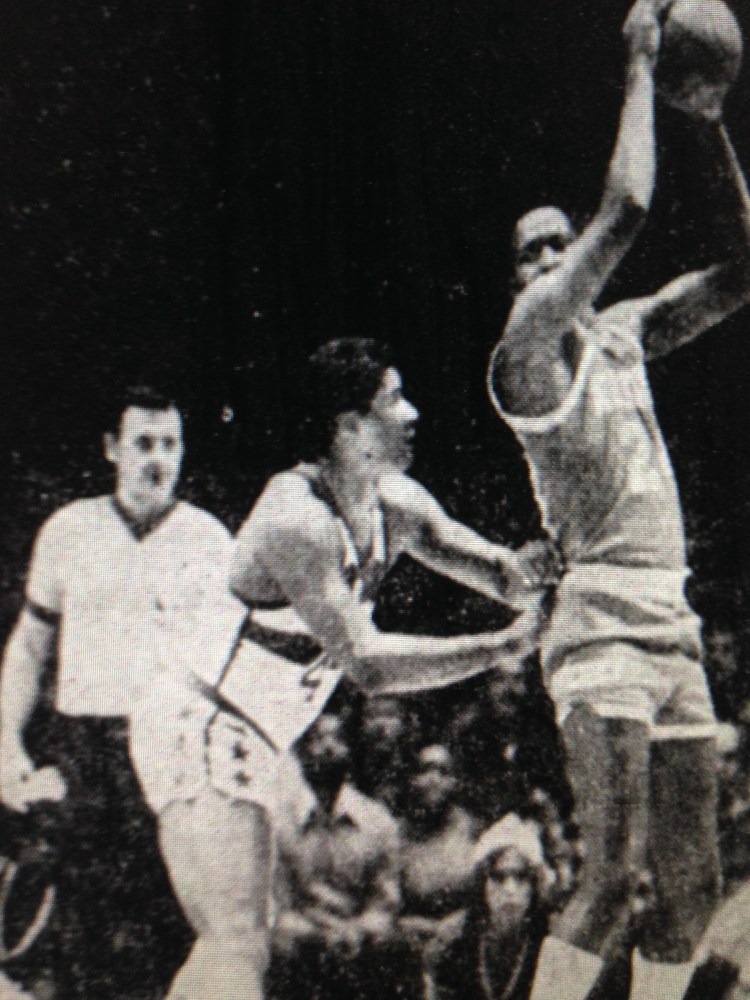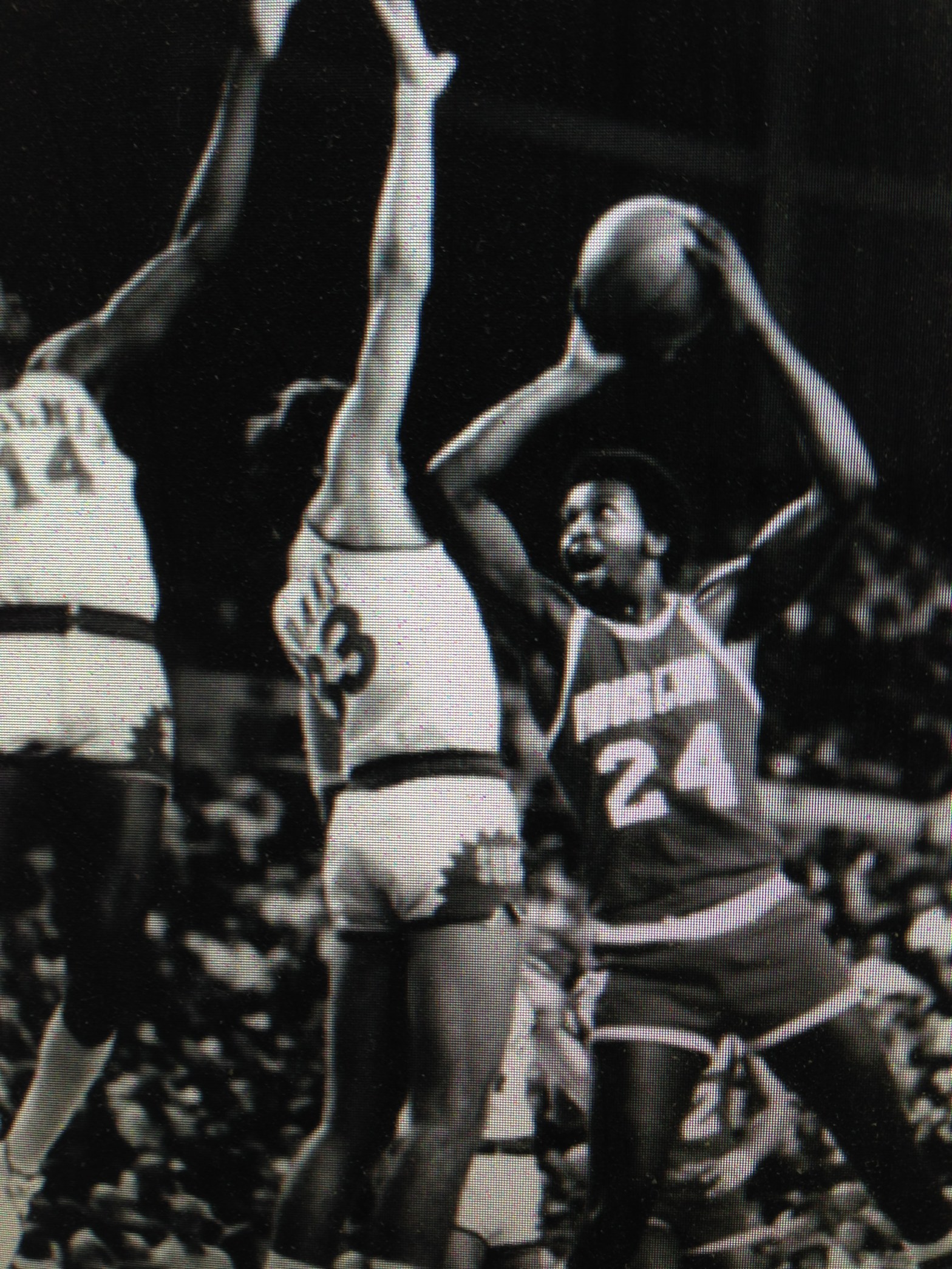[More Moses Malone. This article appeared in the Baltimore Sun on January 4, 1980. The late-great Bryan Burwell wrote the piece. Burwell, who graduated from Virginia State College in 1977, clearly had followed Malone’s development closely.]
—
The bodies were banging, the elbows were flying, the hands were pushing, the legs were tangling, and the man with the Biblical name was catching pure hell.
The deluxe, super-special Capital Centre welcome that Washington Bullets Wes Unseld and Elvin Hayes reserve especially for slender, 6-foot-10 most valuable players—here a Big E push, there an Unseldian bump, everywhere a body crunch—was being served to Moses Malone recently, all within view of referees Wally Rooney and Bill Saar.
No fouls were called.

This game-long treatment finally wore Malone down, and he finished with subpar totals of 22 points (his average is 26.3) and 10 rebounds (well under his league-leading 15.4 average). Later, in the Houston Rockets’ locker room, Malone wearily sat in front of his locker stall to recuperate from the latest of his star wars with Hayes and Unseld. He looked like a fighter after 15 rounds. The towel around the neck . . . the slumped shoulders . . . the drooped head. The long arms rested on the knees. The hands hung down between the legs, and beads of perspiration rolled off the face.
A reporter interrupted his solitude.
“You took a pretty good beating out there tonight, huh, Mo?”
Six seasons ago, the reply might have been a deep, inaudible “mmmm” or “uhhuh.” It might have meant a mumbling colorless interview with a size 12 Converse basketball shoe. It could have resulted in a quick “yes,” an even quicker “no,” or a curt “no comment.”
Six seasons ago, a frightened, bashful, poorly educated, slow-talking, small-town, 18-year-old Southern country boy with a dreadfully poor command of the English language would have buried his face in his sneakers and muttered basic yes-no answers to big-town, fast-talking, college-educated reporters who were looking for far more introspective replies.
Six seasons ago, an interview was a one sentence letter. Today, interviews are novels. Today, they are epics. Today—well, we’ll let Moses tell you about today:
“It’s been going on like this all year. The referees don’t call nothing. It’s really bad now, and because the word has been passed around the rest of the league that the refs won’t call anything, everybody can beat on me. I can’t do nothing about it. I’ve got to bring my boxing gloves every night. I’ve got to lace up the gloves and go ahead and get down. I’m not a big guy like Kareem. Hell, he can take a beating. He’s 7-foot-4 and 235 pounds. Why me? I’m just 6-foot-10, 220. I’m a little guy. Why me? Why me?”
An epic.
Six years ago, things were different. The peach fuzz was just growing on his lip and under his chin. He was a skinny, 6-foot-10 man-child leading Petersburg (Va.) High School to a State AAA championship, to a two-year, 50-0 record, and making his small industrial hometown 30 miles south of Richmond a must-stop for every college basketball recruiter.
Six years ago, he signed a national letter of intent to Maryland, but never played a minute for the Terrapins. When the Utah Stars of the old American Basketball Association lured him away from Maryland, he became the first high school player to jump straight from the prep ranks to the pros and drew reams of national attention.
But six years ago, he was not able to understand all the attention that his 6-foot-10 frame was generating. He was the son of a poor mother who worked in a supermarket putting prices on meats. He was a shy teenager who didn’t like talking to anyone . He mumbled in a deep Southern dialect, which prompted one Salt Lake City disc jockey to label him “Mumbles” Malone.
Today, the peach fuzz has given way to a full goatee and mustache. The body is filled out, and the 18-year-old kid is no longer a man-child. Today, he’s a 24-year-old man. He is mature, thoughtful, and at times witty.
Example: Last year after finding out that he was the NBA’s most valuable player, rebound king Malone told the press contingent: “I couldn’t have won this without the help of my teammates. They missed a lot of shots.”
He still may not be among the top 10 interviews, but he most assuredly isn’t among the bottom 10.
The development has not been limited to intellectual expansion. His physical skills have also blossomed from the time Bullet a general manager Bob Ferry said, “He has a 50-50 chance for failure,” to his present status as NBA most valuable player after the 1978-79 season.
“He is maturing and gaining more confidence every day,” said Houston’s first-year head coach Del Harris. “It’s just the normal progression for a young man. If you really knew Moses then, you know that he always has been very entertaining privately, talked a lot and was a big joker. The only difference between Moses now and six years ago is that he does all that in public now.”
Nine-year veteran Calvin Murphy is Malone’s locker-room neighbor and one of his leading cheerleaders. It was Murphy who dubbed Malone “The Franchise” during the 1976-77 playoffs when the Rockets reached the Eastern Conference finals before being eliminated by Philadelphia. He carefully guards Malone from bad press and expertly guides reporters to the positive sides of his young teammate.
“You must remember that Moses became a superstar long before he knew it. He was a teenager. He wasn’t outgoing. He was kind of shy. So why should he have to change his lifestyle for the press?” Murphy asked. “There were those who think he was dumb just because he didn’t go to college. I think it was the smartest thing he ever did. ”
There is another side of Malone that rarely gains any publicity. His soft side, the one reserved for youngsters. After the Washington game, Murphy and Malone invited a group of youngsters into the locker room to meet some of the players. While the rest of the players were signing autographs on little slips of paper, Malone was autographing new pairs of basketball shoes and giving them away.
Murphy tells another story. “I’ve got this baton-twirling unit back in Houston that is made up of mostly underprivileged black kids, and we were raising money for the trip to a tournament. Well, we were $1,500 short the day before we were supposed to leave, then Moses comes up to me and asks, “I heard you were short. How much do you need?’ I told him how much and he reaches into his pocket and pulls out this big wad of bills and hands me $500. ‘This is all I have on me now.’ he said. ‘But if you follow me home, I can give you the rest of it.’ I did, and he did.
“Well, a few weeks later, we had this awards dinner, and I wanted to invite him to be there so I could introduce him to everyone and tell them what he did. But he refused to go. He told me, ‘That’s all right. They don’t need to know who did it.’
“That’s the kind of guy he is.”
